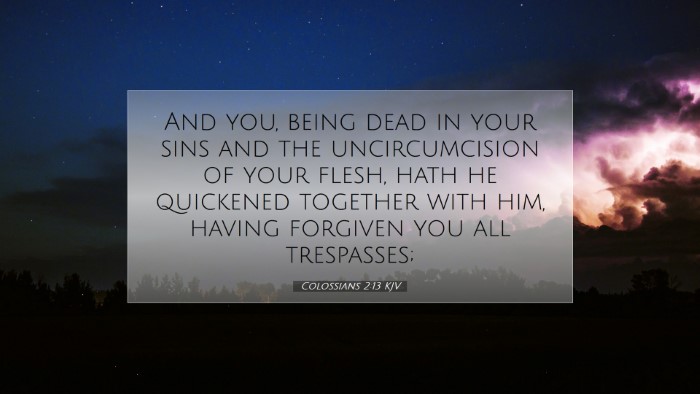Commentary on Colossians 2:13
Verse Text: "And you, being dead in your sins and the uncircumcision of your flesh, hath he quickened together with him, having forgiven you all trespasses;"
Introduction
This verse, found in the apostolic writings of Paul to the Colossians, serves as a profound declaration of the transformation that occurs through faith in Jesus Christ. It encapsulates the transition from spiritual death to life, emphasizing both the supernatural act of regeneration and the significance of forgiveness.
Exegesis of Colossians 2:13
Being Dead in Sins: The phrase "being dead in your sins" reflects the state of all humanity apart from Christ. Matthew Henry notes that this spiritual death entails not just a mere separation from God but also a total inability to respond to divine grace. Albert Barnes elaborates that this death indicates a life characterized by sin, producing inevitable consequences including guilt and estrangement from God.
The Uncircumcision of Your Flesh: The term "uncircumcision" here symbolizes a state of spiritual defilement. Adam Clarke explains that Paul contrasts physical with spiritual circumcision, indicating that mere adherence to rituals does not equate to genuine spiritual condition. This embodies the sense of alienation from God's covenant people, which further deepens the plight of the unregenerate.
The Divine Intervention
Hath He Quickened Together: The phrase "hath he quickened together" reveals the power of God’s grace. This quickening entails revitalizing those who were spiritually dead, effectively restoring them to new life in union with Christ. Barnes affirms that this act of divine grace is not merely a resuscitation but a complete transformation of one’s spiritual state.
Forgiveness of Trespasses
Having Forgiven You All Trespasses: The complete and total forgiveness offered to believers is foundational to Christian faith. Henry emphasizes that this forgiveness is not partial; God forgives "all trespasses," thereby offering total redemption. Clarke comments on the significance of this forgiveness, noting that it challenges the believer to forgive others, underscoring the relational aspect of divine pardon in the community of faith.
Theological Implications
This verse teaches significant theological truths that are vital for pastors and theologians. It encapsulates Christ’s atoning work and offers a rich understanding of salvation:
- The Nature of Humanity: All are dead in sin, underscoring the need for divine intervention.
- The Work of Christ: Christ’s death and resurrection facilitate this newfound life.
- The Assurance of Forgiveness: Believers are assured of complete forgiveness through faith.
Application for the Believer
For those in the Christian faith, this verse reassures believers of their standing before God. Understanding that they have been quickened gives strength to live in a way that reflects this new life. Henry expresses that this reality motivates believers to live in gratitude and obedience to God. Clarke encourages believers to walk in this newness of life as a testament to God’s transformative power.
Conclusion
Colossians 2:13 captures the essence of the Christian Gospel—death, transformation, and forgiveness. It is a clarion call for believers to acknowledge their prior condition while fully embracing the new identity granted through Christ. As we meditate upon this passage, let us be glad in the full understanding that we are alive in Him, having received forgiveness and new life. This is a profound truth that informs our faith and practice as followers of Christ.


